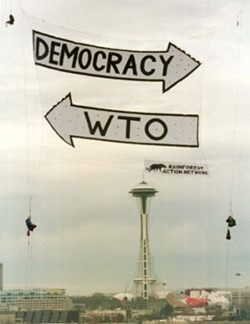| Part 6: The Opponents of Globalization
Those skeptical about or opposed to globalization argue that, although the textbook world of free trade is lovely and perfect, in the real world, globalization has many costs—lost jobs, labor exploitation, human rights abuses, the encroachment of corporate power on the political realm, environmental degradation, and concentration of wealth, to name just a few. Since most of these costs are not measured by corporate balance sheets—or because corporate balance sheets are improved because of them—they don’t frequently register in the media. Although in the long run free trade may work, they say, in the long run we are all dead: the answer is prudent policy. (See, for more on this, The Economic Policy Institute’s trade and globalization website below.) Or, for some, the answer is another mode of economic organization altogether. (See, for more on this, Infoshop’s anti-capitalist activist website, also below.) For the many opponents of globalization the bottom line is that it fails to live up to its grandiose promise of prosperity for all. (For more on this, see The AFL-CIO global economy website). |
|

|
WEBSITE: For a view supporting prudent policy:
Economic Policy Institute trade and globalization
http://www.epinet.org/subjectpages/trade.cfm?CFID=1573862
WEBSITE: For an anti-capitalist activist view:
Infoshop
http://www.infoshop.org/octo/index.html
WEBSITE: For a critique of globalization’s failed promise of prosperity:
AFL-CIO
http://www.afl-cio.org/issuespolitics/globaleconomy/ |
November, 1999. Protestors using climbing
gear and ropes illegally hang a flag from a
construction crane in downtown Seattle in
protest of the WTO conference being held
at the Washington State Convention Center
Monday. Officials estimate more than 30,000
protestors will converge this week in Seattle.
(Loren Callahan/Reuters)
http://www.ran.org/jpegs/wto.jpg
|


